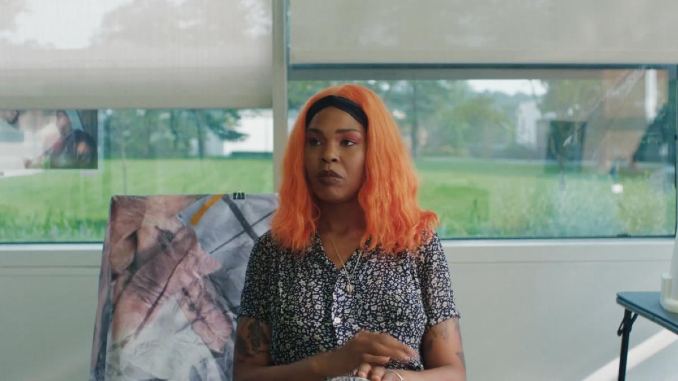The African Desperate Is a Composed, Critical Examination of Race

Nobody’s better versed in matters of race than white people, assuming one of the two following conditions is true: When they outnumber people of color in a conversation, or when they’re in the sole company of their fellow honkies. Martine Syms’ excellent feature debut The African Desperate opens in media res on the former scenario, where the power dynamic puts Blackness under a white microscope. Palace Bryant (Diamond Stingily) sets up and sits down, waiting for the MFA thesis committee to assemble and pass judgment for the final time in her journey through art school; when they finally arrive, talk gets alternatingly fluffy, heavy, knotty and, in the parlance of the day, problematic, which is just a neutral way of saying “straight-up racist.” Some committee members flatter Palace seemingly out of hand. Others speak in such a highfalutin patter that Syms’ viewers, like Palace, may furrow their brows as they mentally untangle the nonsense dialect to figure out what in the hell’s being said. Others still make comments they shouldn’t. Again: Racism.
It’d be unfair to Syms to say that the whole film is in this opening scene; there are, after all, about 90 minutes left to go once we’re through the first nine. But an awful lot of The African Desperate happens in those nine, or at least is established in those nine, and—depending on your personal experiences—those nine are crucial for framing the way that you engage with the remaining 90.
“Where do broken hearts go?” reads a blink-and-you’ll-miss-it caption that flashes after the film’s opening credits blitz. “Can they find their way home?” Palace is in tears, smoking a joint from behind a pair of sunglasses, trying to take the edge off of that committee meeting before she kicks off the first day of the rest of her life. It doesn’t help. Nothing can. All Palace wants is to pack up and get the hell out of Dodge (actually just upstate New York), and make haste back to her home in Chicago. Try as she might to pull an Irish goodbye, though, Palace can’t seem to leave because she keeps running into people who plead with her to stick around a little while longer. (Luis Buñuel approves.)
The African Desperate makes careful note of who’s getting in Palace’s way, and for the most part it’s the white kids. This is likely because most of the students at school are white, though other Black students pop up here and there in whiteness’ midst. Still, the school’s atmosphere is chiefly pasty. Palace isn’t repelled by whiteness; her strongest friendship, after all, is with Hannah (Erin Leland). But well-meaning whiteness still has a way of ramming its foot into its mouth, like humble-bragging about seeing Moonlight in theaters twice and then lamenting that you’d have seen it a third time if you could.
-

-

-

-

-

-

-

-

-

-

-

-

-

-

-

-

-

-

-

-

-

-

-

-

-

-

-

-

-

-

-

-

-

-

-

-

-

-

-

-








































